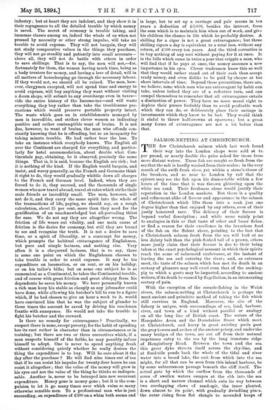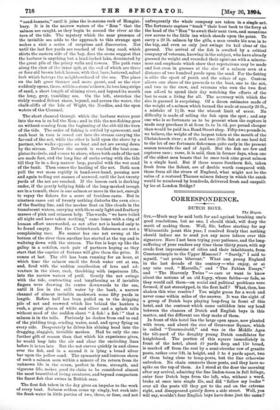SALMON-NETTING AT CHRISTCHITRCH.
THE few Christchurch salmon which last week found their way into the London shops were sold at 4s. per pound, or nearly double the price asked for those from more distant waters. These fish are caught so fresh from the sea that the salt is hardly washed from their scales ; in the very month of the swift fresh river, yet within a stone's-throw of the breakers, and so near to London by rail that the epicure may see the fish upon his dinner-table within a few hours of the time that it was thrown glittering upon the white sea sand. Their freshness alone would justify their reputation in the London markets. But there is a quality and refinement alike of flavour and appearance in the salmon of Christchurch which lifts them into a rank just one degree higher than that enjoyed by any others, even of their justly honoured race. The delicacy of their flavour is beyond verbal description ; and while some vainly point to analogies in this or that taste of other and baser fishes, or find a reason for their excellence in the luxurious food of the fish on the Solent shore, pointing to the fact that a Christchurch salmon fresh from the sea will look at no less dainty bait than the pink-fleshed tail of a prawn, others more justly claim that their flavour is due to their being taken at the exact psychological moment in which their spirits reach the acme of salmonoid exuberance, at the instant of leaving the sea and entering the river; and, as extremes meet, the taste of the salmon which has met its death in an ecstasy of pleasure may well excel even that of the sucking- pig to which a gusto may be imparted, according to ancient writers, if its death be caused by flagellation, in an intenerating ecstasy of pain.
With the exception of the coracle-fishing in the Welsh rivers, the salmon-netting at Christchurch is perhaps the most ancient and primitive method of taking the fish which still survives in England. Moreover, the site of the fishery is unique, with surroundings of sea, land, harbour, river, and town of a kind without parallel or analogy on all the long line of British coast. The waters of the Hampshire Avon and the Dorsetshire Stour which meet at Christchurch, and hurry in great swirling pools past the grey towers and arches of the ancient priory, and under the many bridges of the town, are cut off from their natural impetuous entry to the sea by the long ironstone ridge of Hengistbury Head. Between the town and the sea, this great dyke thrusts itself across the sky-line, and at flood-tide ponds back the whole of the tidal and river water into a broad lake, the exit from which into tle sea might, for all that can be seen from this inland harbour, be by some subterranean passage beneath the cliff itself. The actual gate by which the outflow from the thousands of acres of swollen waters escapes at the ebb into the sea is a short and narrow channel which cuts its way between two overlapping claws of sand-spit, the inner planted, down almost to its point, with gradually dwindling pima, the outer rising from flat shingle to mounded heaps of
" sand-bennets," until it joins the ironstone rock of Hengist. bury. It is in the narrow waters of the " Run " that the salmon are caught, as they begin to ascend the river at the turn of the tide. The mystery which the near presence of the invisible sea adds to the approach to this strange spot makes a visit a series of surprises and discoveries. Not until the last few yards are reached of the long road, which skirts the eastern side of the bay, does the scene suggest that the harbour is anything but a land-locked lake, dominated by the great pile of the priory walls and towers. The path runs along the claw of the inner spit, at the end of which are three or four old brown brick houses, with that bare, battered, salted look which betrays the neighbourhood of the sea. The pines on the left grow thinner and more gaunt, and as the view suddenly opens, there, within a stone's-throw, lie two long strips of sand, a, short length of shining river, and beyond its mouth the long, grey, tumbling sea. On the left, stretches the richly wooded Solent shore, beyond, and across the water, the chalk-cliffs of the Isle of Wight, the Needles, and the open waters of the Channel.
The short channel through which the harbour waters pour into the sea is called the Run; and in this the net-fishing goes on without ceasing from the beginning of the ebb till the turn of the tide. The order of fishing is settled by agreement, and each boat in turn is rowed out into the stream carrying the far-end of the net, while the other is held upon the shore by a partner, who walks opposite as boat and net are swung down by the stream. Before the mouth is reached the boat com- pletes its circle, and comes to shore, where both ends of the net are made fast, and the long line of corks swing with the tide till they lie in a deep narrow loop, parallel with the wet sand of the bank. Then comes the hauling of the net. Both men pull the wet mass rapidly in hand-over-hand, pausing now and again to fling out masses of seaweed, until the last twenty yards of the net are reached. If the bosom cork is ducking under, if the gently bellying folds of the long-meshed trough are in a tumult, there is one salmon or more in the net, enough to repay the fishers for a score of fruitless casts. But in nineteen cases out of twenty nothing disturbs the even sinus of the floating line, and the meshes float on like clouds in the translucent waters, carrying with them only light and feathery masses of pink and crimson kelp. The words, "we have toiled all night and have taken nothing," came home with a ring of human effort unrewarded, as net after net is hauled only to be found empty. But the Christchurch fishermen are not a complaining race. No sooner has one net swung at the bottom of the river than another has started at the top and is waltzing down with the stream. The fan is kept up like the gallop in a cotillon, each pair of partners hoping as they start that the caprice of fortune will give them the prize. It comes at last. The ebb has been running for an hour, at which time the salmon smell the fresh water out at sea, and, fired with the sudden recollection of love and ad- venture in the river, rush, throbbing with impetuous life, into the narrow waters of peril. Gently the net swings with the tide, contracting and lengthening as if invisible fingers were drawing its centre downwards to the sea, until it lies in the still water by the bank, a narrow channel of almost invisible meshwork some fifty yards in length. Before half has been pulled on to the dripping pile of net and seaweed which lies behind the haulers a rush, a great gleam of white and silver and a splash tells without need of the sudden shout "A fish ! a fish !" that a salmon is in the toils. Furiously he dashes from end to end of the yielding trap, sending water, sand, and spray flying on every side. Desperately he drives his shining head into the dragging, sluggish, invisible meshes. Had he only the one further gift of reason than that which his experience gives, he would leap into the air and clear the encircling lines before it is too late. But the net curves quickly in and closes over the fish, and in a second it is lying a broad silver bar upon the yellow sand. The symmetry and lustrous sheen of such a salmon seen within a minute of its return from its unknown life in the ocean, perfect in form, strength, and vigorous life, makes good its claim to be considered almost the most beautiful of living creatures, and beyond comparison the finest fish that swims in British seas.
The first fish taken in the day gives an impulse to the work of every boat. Salmon seldom come up singly, but rush into the fresh water in little parties of two, three, or four, and not
unfrequently the whole company are taken in a single-net. The fortunate captors "track" their boat back to the ferry at the head of the " Run." to await their next turn, and meantime row across to the little inn which stands upon the point. To carry a 20 lb. salmon by the gills, a man crooks his arm in to the hip, and even so only just swings its tail clear of the ground. The arrival of the fish is awaited by a critical company of veterans, knowing in the subject, who have already guessed its weight and recorded their opinions with a minute- ness and emphasis which show that reputations may be made and lost even in guesses at the size of a salmon seen at a distance of two hundred yards upon the sand. For the fishing is alike the sport of youth and the solace of age. Custom allows one share of the proceeds to the boat, one to the net, and two to the crew, and veterans who own the two first can afford to spend their day watching the efforts of the last to earn a living for all. The accuracy with which the size is guessed is surprising. Of a dozen estimates made of the weight of a salmon which turned the scale at exactly 20 lb.,. a mistake of 1;1 lb. was the utmost limit of error. No difficulty is made of selling the fish upon the spot ; and any one who is so fortunate as to be present when the capture is made may purchase it at from 2s. to is. 6d. per pound cheaper than would be paid in a Bond Street shop. Fifty-two pounds is, we believe, the weight of the largest taken at the month of the- Christchurch river; a 40 lb. and two 20 lb. fish at one haul fell to the lot of one fortunate fisherman quite early in the present season towards the end of April. But the fish are few and, captures rare ; rarer, it is said, than in former days, when one- of the oldest men boasts that he once took nine great salmon- in a single haul. But if these scarce Southern fish, taken fresh from the Solent, are of double worth compared with those from all the rivers of England, what might not be the- value of a restored Thames salmon fishery in which the catch would be numbered by hundreds, delivered fresh and unspoilt by ice at London Bridge P



































 Previous page
Previous page